Your Ultimate Guide: Key Phrases For Business Trips in China ✈️
Want a Stress-Free Business Trip? Learn Key Phrases for Booking Flights, Hotels, and Transportation in Chinese

Travelling for business in China can be both exciting and challenging.
Even though it’s becoming more common for the staff to speak English in the tourism industry, you never know when you will need to sprinkle in some Chinese to make the journey smooth.
Especially for booking flights, hotels, and transportation, it’s crucial to know the exact words. Otherwise, you might end up on a flight to Chongqing when your business meeting is in Chengdu!
In this blog post, we’ll introduce you to all the necessary phrases and tips to handle travel logistics in China like a local 🙌
Chinese Business Trips || Key Vocabulary for Booking Flights
Chinese Business Trips || Essential Phrases for Booking Hotels
Chinese Business Trips || Transportation Tips and Useful Phrases
Chinese Business Trips || FAQs
Chinese Business Trips || Key Vocabulary for Booking Flights

Booking a flight in China can be a hassle if you’re just learning the language. Pay special attention to these terms and remember them precisely.
To say you want to book a ticket, always refer to this word:
预订
yù dìng
Book
Or you can just simply use this single character in a casual conversation.
订
dìng
Book
机票
jī piào
Flight ticket
For example:
我想订一张从北京到上海的机票。
I want to book a flight ticket from Beijing to Shanghai.Now here are some vocabularies to specify the details of the flight.
|
航班
háng bān | Flight number |
|
出发
chū fā | Departure |
|
到达
dào dá | Arrival |
|
单程票
dān chéng piào | One-way ticket |
|
往返票
wǎng fǎn piào | Round-trip ticket |
For example, to ask about the departing time of the flight, you can say:

这个航班几点出发?Zhè ge háng bān jǐ diǎn chū fā?
What time does this flight depart?
If you want to book a round-trip ticket, you can say:
我想预订一张往返票。
Wǒ xiǎng yù dìng yī zhāng wǎng fǎn piào.
I want to book a round-trip ticket.
As you know, being a frequent traveler, flight companies have different policies on luggage and carry-ons. You will need to pay attention to these words.
行李
xíng lǐ
Luggage
行李限额
xíng lǐ xiàn é
Luggage limit
随身行李
suí shēn xíng lǐ
Carry-on
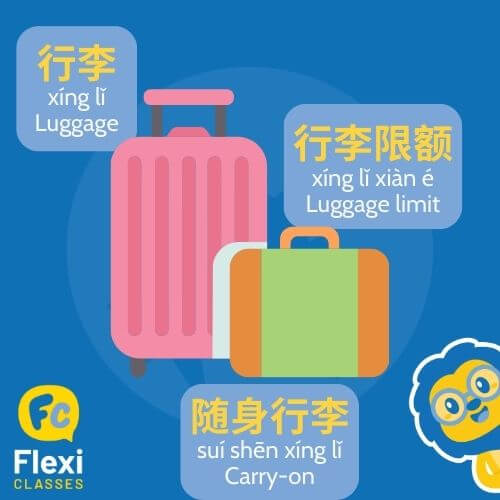
To ask about the limits of luggage when booking, you can say:
这个航班有行李限额吗?
Zhè ge háng bān yǒu xíng lǐ xiàn é ma?
Is there a luggage limit on this flight?

30+ Basic Business Chinese Vocabulary: Business Essentials
Do Business Like a Local || Commonly Used Business Chinese Vocabulary So, you have decided to do business in China. That’s great! However, you should be prepared to deal with locals who don’t speak English. If you want to develop…
Chinese Business Trips || Essential Phrases for Booking Hotels
Like booking flights, there are also some important to pay attention to when booking hotels in China.
Not all hotels accept foreign guests since they only accept National IDs for check-ins – however the government is currently trying to overhaul this system and make it easier for foreigners
Here are some basic phrases you should remember first.
酒店
jiǔ diàn
Hotel
房间
fáng jiān
Room
入住
rù zhù
Check-in
退房
tuì fáng
Check-out
For example, to ensure that you can stay in the hotel as a foreigner, you can ask:
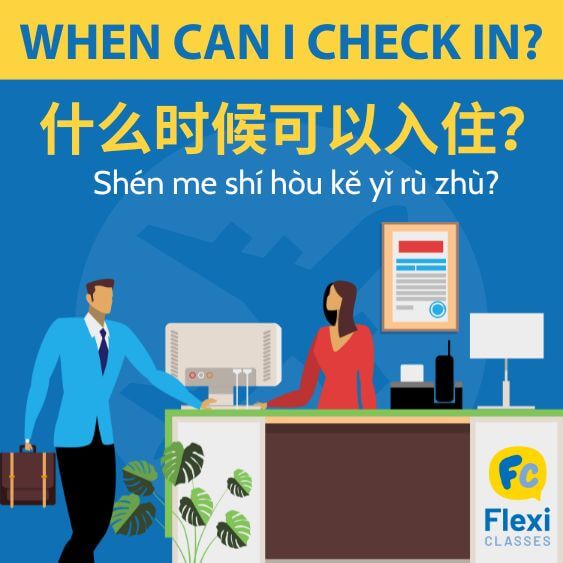
外国人可以入住吗?
Can foreigners check in?And this phrase is always helpful to ensure the check-in time so you can put off your leavy luggage.
什么时候可以入住?
When can I check in?If you also want to extend your check-out time, you can ask:
我可以延迟退房吗?
Can I check out later?In most cases, you will have the option to choose between a double standard room or a suite for your trip. Here are the vocabularies for room types and anything that come with it.
双人房
shuāng rén fáng
Double room
套房
tào fáng
Suite

有没有空房?
Yǒu méi yǒu kōng fáng?
Do you have any available rooms?
If you are sensitive to the surrounding environment of your rooms, you can always request a specific quieter room or non-smoking room.
我要一间安静的房间。
I want a quiet room.无烟
wú yān
non-smoking
房间是无烟的吗?
Is the room non-smoking?早餐
zǎo cān
Breakfast
无线上网
wú xiàn shàng wǎng
Wi-Fi
It’s always helpful to ask if breakfast and Wi-Fi are included in your room. You can say:
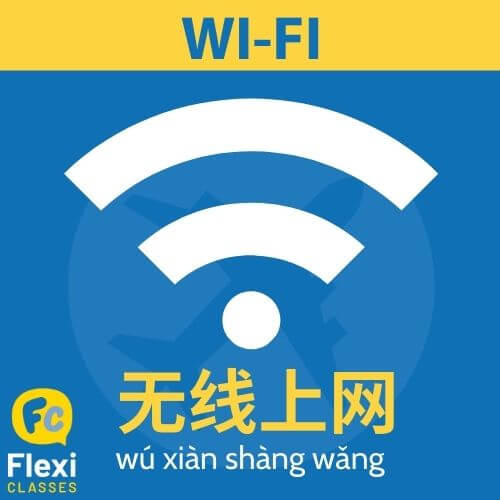
酒店提供早餐吗?
Does the hotel provide breakfast?It’s pretty common for Chinese to refer to Wi-Fi just in English. So you can just ask:
请问,房间里有Wifi吗?
Excuse me, is there Wi-Fi in the room?Chinese Business Trips || Transportation Tips and Useful Phrases
Moving around and getting to different places are the most frequent scenarios in which you will need to speak Chinese.
Unlike hotels and flights where staff are better trained to speak English, you’d often need to ask around in Chinese when navigating local transportation.
First, some basic phrases to help you get around.
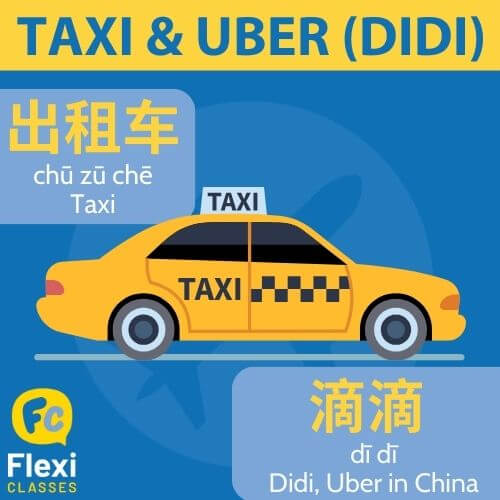
出租车
chū zū chē
Taxi
Or now, in most cases, you will call an Uber, which is called Didi in China.
滴滴
dī dī
Didi, Uber in China
我要去…
I want to go to…When you get on a Didi, you will often confirm with the driver of your destination.
我要去这个地址
I want to go to this address.|
地铁
dì tiě | Subway |
|
公交
gōng jiāo chē | Bus |
|
车站
chē zhàn | Station |
怎么走?
How do I get there?So to ask about the nearest subway station, you can say:
最近的地铁站在哪里?
Where is the nearest subway station?When you’re in China, a high-speed railway can be much more convenient than flights to travel between cities.
|
高铁
gāo tiě | High-speed railway |
| speak 火车站] huǒ chē zhàn | Train station |
|
票
piào | Ticket |
多少钱?
How much?
To book a high-speed railway ticket, you can say:
我想预订一张去上海的高铁票。Wǒ xiǎng yù dìng yī zhāng qù Shànghǎi de gāo tiě piào.
I want to book a high-speed railway ticket to Shanghai.
Usually, you’ll need to choose the tiers of your seat.
|
一等座
yī děng zuò | First-class seat |
|
二等座
èr děng zuò | Second-class seat |
| 商务座 shāng wù zuò | Business-class seat |
Last but not least, always remember to find the ticket gate for your train.
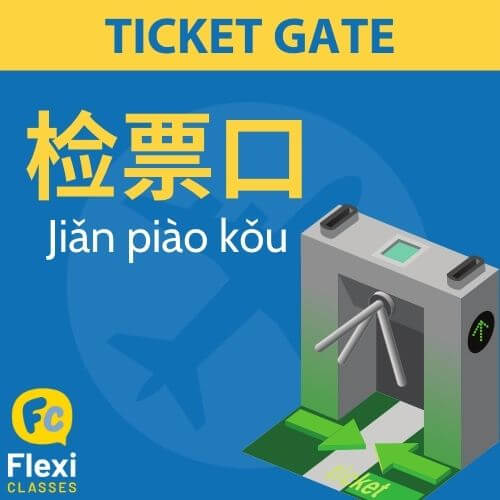
检票口
Jiǎn piào kǒu
Ticket gate
You can ask with this sentence:
检票口在哪里?
Where is the ticket gate?Now you’ve got a lot to digest. Take your time to practice in daily scenes as you travel and get around. They seem complex, but once you master them, you’ll travel around China smoothly like a local.

Websites to Learn Chinese 🖥️ 46 of the Best Sites out there to Learn Mandarin in 2024
The BEST Websites To Learn Chinese // paid, free, tutors, courses and software // See EVERY Website to learn Chinese on your computer.
Chinese Business Trips || FAQs
What is business trip in Chinese?
“Business trip” in Chinese is 出差 (chūchāi).
How do I ask for a non-smoking room in Chinese?
You can ask, 房间是无烟的吗? (fáng jiān shì wú yān de ma?). Is the room non-smoking?
What is the most frequent transportation to go between cities in China?
You’ll often need to take 高铁 (gāo tiě), which is the high-speed railway that’s much more convenient than flights in China. To book a ticket, you can say, 我想预订一张高铁票 (Wǒ xiǎng yù dìng yī zhāng gāo tiě piào) – I want to book a high-speed railway ticket.
How do I ask where the nearest subway station is in Chinese?
You can say, 最近的地铁站在哪里? (Zuì jìn de dì tiě zhàn zài nǎ lǐ?). – Where is the nearest subway?
How do I confirm the departure time of a flight in Chinese?
You can say with 这个航班几点出发? (Zhè ge háng bān jǐ diǎn chū fā?) – when does this flight depart?
How do I ensure that a hotel accepts foreign guests in Chinese?
You could use this sentence. 人可以入住吗? (wài guó rén kě yǐ rù zhù ma?) – Can foreigners check in?
Do you know any other useful phrases for business travel in China? Share with us here!
Want more from LTL?
We offer a 7 day free trial to all new students where you can study Mandarin 24/7. Come and check it out free of charge and see what you think.
We also offer immersive Chinese courses in China. You can learn more about those here.
Sign up below and become part of our ever-growing community.









